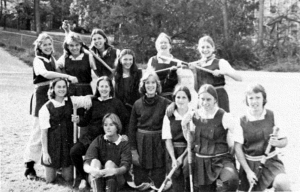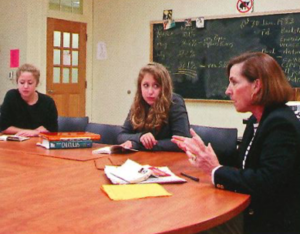Wynne Curry H’71

Uniforms; saddle shoes; field hockey; the Green and the Gold teams for athletics; book bags, not backpacks. There’s so much I remember about being a student at Hillsdale! I arrived there in 1965 for seventh grade. The uniforms especially were a big deal. They had to reach down to the middle of our knees. We would have to kneel down and the hem of our uniforms had to touch the ground. If it didn’t, a note was sent home and parents had to lower those hems.
Harvest Fair happened every fall in the old gym. There’d be little booths where we could buy all these different handmade things, like potholders. It was run by the students’ mothers, who wore gingham aprons.
During gym class once a year, when we were in the seventh and eighth grade, we had posture pictures where we would all have to line up and, one by one, come in front of a screen. There was a bright light, and we’d stand on the other side of the screen so the bright light could project our silhouette. Our gym teachers would sketch our outline and talk to us about our posture. I know it all sounds weird now.

By the time we were freshmen, we were also observing and participating in the huge societal changes and upheavals that were happening during the 60s and early 70s. Most of all, I felt like I graduated from Hillsdale with classmates and friends who remain some of my closest friends to this day.
In January of 1986, right after my daughter Lisa was born, I came to interview for a college counseling position. I said, “I’m happy to do part-time college counseling, but can you please, please, please give me one French class? After all, that’s the discipline that inspired me to become a teacher.” The school was able to make that happen. When I started in August that year, I was returning to such a different place than the all-girls school where I had been a student. And yet, there was an ethos that was still there. A collegiality and a trust — a trust between students and teachers and between teachers and the administration.
I remember being surprised how financially challenged the school was. We were practically counting paper clips. We had to be careful about using the Xerox machine. But there was this whole esprit de corps among the faculty, and I thought, By god, this school will get there. Peter Briggs had successfully marshaled the school through those challenging years following the merger. Then when Peter retired, and Debbie Reed came on board, it was as though we were catapulted into the 21st century. More technology. Digital instruction. New buildings. By the early 2000s, we called the campus “Versailles on Red Bank.”

Every seven years, we are evaluated by ISACS. I remember a few evaluation cycles ago, at the end of the process, the evaluators met with the faculty from all four divisions and dismissed the administrators. They said, “OK, now is your time to tell us things off-the-record that need to be addressed.” We’d all had opportunities to share things on-the-record that we thought could be improved, but this was supposed to be where any malcontents would be really free to pipe up. The evaluators said, “Please tell us anything we need to address with the top brass; it will be completely confidential.” I remember people kind of looking around at each other, like Nope, I don’t have anything to add that I wouldn’t have already said on-the-record. It was this golden moment, like wow, this really is an incredible school.

I’m proud of how my colleagues and I were able to help strengthen the world languages department. By the time I left, we offered French, Latin, Spanish, and Chinese, which is a very robust world languages program, especially for a school our size. We saved a struggling Latin program; we introduced two Spanish courses designed for language-challenged students, rather than offer them exemptions from world languages altogether. The school also started doing more international exchange programs. That’s important because it’s largely through speaking another language that you come to know a culture. If you visit another country, you can see all of the sites, but if you cannot speak to the people who live there, who can tell you in their language what’s what, then you’re still on the outside.

With my students, I loved seeing them slowly gain confidence and start to speak in French. There were some students who would simply drop all their inhibitions and just start to babble. Some of what they were saying might have come out hard to understand, but by God, a French speaker could understand what they were saying. They would let it flow, and I loved that.
As both a teacher and a college counselor, I’ve always felt that students need other adults in their lives, other than their parents. An adult who would not be judgmental or reactive, and would say, “Talk to me about your life. Tell me what you think I need to know to know you better. Tell me what’s important to you.” I learned so much from their stories. In the role of confidant, I let students know my door was always open, and I’d mostly listen. We needed to be patient with them, and you could try to give them a few strategies for whatever they were dealing with, but I think the best thing you could do was to be that supportive, empathic ear.

